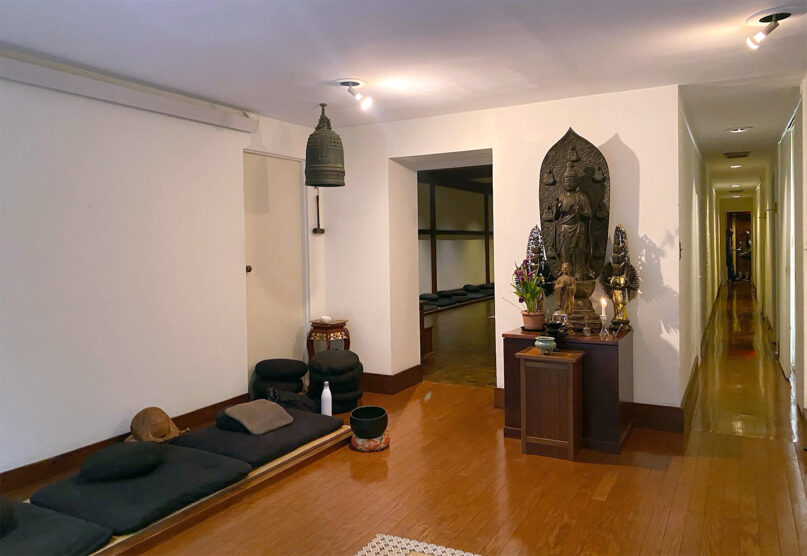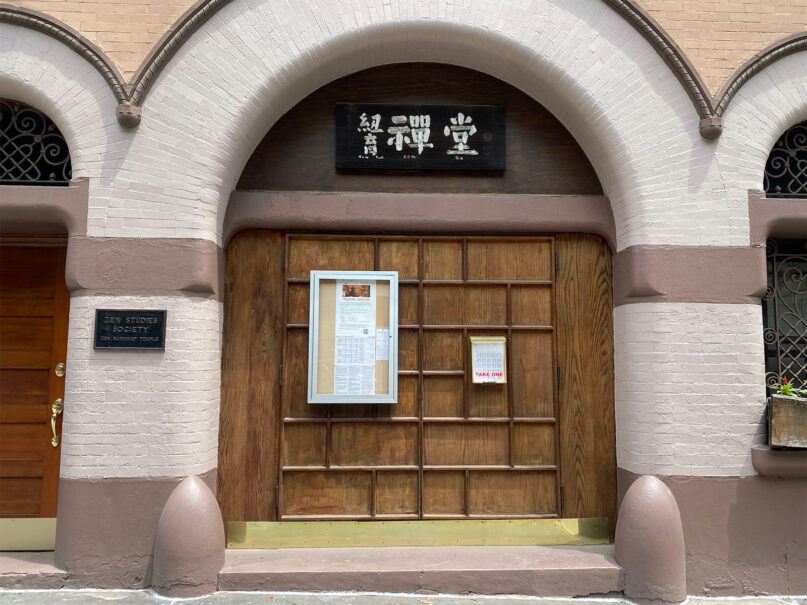NEW YORK (RNS) — New York Zendo Shobo-ji was quiet on a Saturday morning in late June, far removed from the muted hum and chatter that lingers in Lenox Hill, in Upper Manhattan, even on rainy summer days.
Inside, a small group of young adults sat zazen as an ordained member of the Triratna order led them through a mindfulness meditation. “Be aware of the sounds around you, the quality of the air,” the practice leader said. As if on cue, a bird began cooing in the temple’s garden.
The fact that everyone in attendance was on the younger side was by design: The practice is part of the Young Buddhist Initiative, a program designed to help those age 35 and under explore Buddhist teachings and meditation — no experience needed. Previous sessions have covered topics such as mindfulness, the three poisons (greed, hatred and delusion, the root mental states that Buddhists say cause human suffering) and the meaning of enlightenment.
The initiative is run by the Triratna Buddhist Community of New York and New Jersey, part of the international Triratna Buddhist Community founded in 1967 by Sangharakshita, the British spiritual teacher born as Dennis Lingwood. “Triratna” refers to the Three Jewels or Three Refuges of Buddhism: the Buddha, Dharma (the Buddha’s teachings) and Sangha (the Buddhist community). The fellowship describes itself as bringing Buddhist traditions into the modern world in a way that suits contemporary lives.
In the United Kingdom, young people’s retreats can attract more than 100 attendees; in the United States, it’s just getting started. While the New York-area branch doesn’t have a permanent headquarters, it runs regular Zoom events as well as in-person meetings and retreats at various locations, such as New York Zendo Shobo-ji.
Ananta, who goes by a single name and is CEO of the nonprofit Karuna USA, led the recent day’s practice, guiding the meditation from awareness of one’s breath, body and surroundings to a reflection and discussion on recent actions that participants felt either proud of or guilty about — not to be deemed morally good or bad but to reflect on and let go.

The New York Zendo Shobo-ji in the Manhattan borough of New York. (Photo by Evan Sung)
“Experiences are preceded by mind, led by mind, and produced by mind,” he read from the Dhammapada, a collection of the Buddha’s sayings. “If one speaks or acts with an impure mind, suffering follows even as the cart wheel follows the hoof of the ox … If one speaks or acts with a pure mind, happiness follows like a shadow that never departs.”
The Young Buddhist Initiative began out of a desire to create a nurturing space where young people could support each other in their spiritual practice. Ananta came across Buddhism at age 18 through a meditation group at his university in London and knows the value of having a cohort of like-minded peers. “There are people like you who also have spiritual aspirations and are interested in leading a particular lifestyle. That can be very supportive.”
Tamojyoti, an ordained member of the Triratna community who goes by a single name, agreed. “We just have a different consciousness than young people. And I think maybe why those young people groups work so well is because that consciousness can flourish,” she said.
One of the attendees at the session, Kizzy Joseph, a 28-year-old therapist from Brooklyn, was seeking to have conversations about spirituality with people in her age group and had been looking for Buddhist spaces across the city. Most groups she found took a too-intellectual approach to Buddhism, skewed older or were predominantly white.
Headed to her first meeting with the Young Buddhist Initiative, Joseph feared she would be the only Black person in the room. “To my happy surprise, there were three other women of color and another person of color — I think they identify as nonbinary. I was really surprised by how diverse the space was.”
According to the 2023 PRRI Census of American Religion, the average age of a U.S. Buddhist is 52, but survey numbers come with the caveat that gathering statistics about Buddhists is difficult, as many people, like Joseph, engage in Buddhist beliefs and practices without formally identifying as Buddhist.

The New York Zendo Shobo-ji in Manhattan’s Lenox Hill neighborhood in New York. (Photo by Evan Sung)
Protestant by birth, Joseph became unhappy with the rigid religious structure she was raised in and began exploring different approaches to spirituality in her teens. She feels a “gentle calling” toward Buddhism and finds it less forceful than the faith of her childhood, but doesn’t define herself as a Buddhist. In her personal life, she also practices ancestor veneration and Reiki.
Still, the Young Buddhist Initiative provides something that she hadn’t found in other spaces: a feeling of connectedness and emotional safety.
“It’s first and foremost about creating an environment where people of all ages, including younger people, feel comfortable and welcome. One of the things I’m noticing is that we have a number of transgender people that are young, and so I think it feels almost like the environment is open and welcoming for everyone,” said Michael King, a 58-year-old New Yorker who has been attending Triratna meetings and practices for four years. (Despite its name, New York’s Triratna practice attendee ages typically range from 40 to 60, hewing closely to PRRIs national average.)
The group tries its best to cultivate that environment. Those in attendance at the late June session spoke quietly but frankly about fights in personal relationships or embarrassing moments at work, receiving acceptance, not judgement, in return. A break for tea and cookies in the temple’s kitchen made room for casual conversation. When it was time to discuss karma and hypothetical moral situations, we were reminded that it’s not about a strict binary of “good” or “bad,” but “skilled” or “unskilled”: that is, aligned with Buddhist precepts and leading to either happy or unhappy results.
The five precepts of Buddhism — abstaining from killing living beings, stealing, sexual misconduct, lying and intoxication — were also interpreted through a modern lens. Alcohol, for example, was considered not to be bad if used moderately; on the other hand, mindlessly scrolling through social media could become a form of intoxication. The group discussed white lies, supporting friends and power dynamics, never landing on an answer that was considered universally correct.
For Tamojyoti, Buddhism can provide a way to transform the anxiety that many young people feel in response to the state of the world into action. “Young people want to stand for something, and Buddhism is all about your truth, your values, interconnection, compassion.”
“If we’re going to change the way this world is operating, it’s going to happen through young people,” King said, expressing a desire for young people to come to the Dharma and make an impact. “I think a lot of people in my generation have wanted to live more of a Dharmic life, meaning that we’re pulling away from those structures. But those structures can’t change unless we’re in there changing them.”



